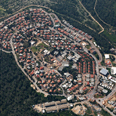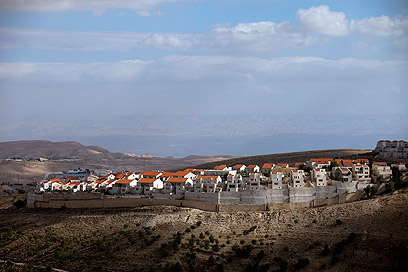
The four European members of the UN Security Council - France, Britain, Germany and Portugal are criticizing Israel and demanding an immediate halt to new settlement construction.
Representatives of the 14 council members stepped to the microphone outside the chamber after their monthly Mideast briefing Wednesday to denounce the Israeli settlement plans, which they warned is threatening a two-state peace settlement with the Palestinians. The council president said they did so because efforts to get all 15 members to agree on a resolution or statement had failed, almost certainly because of US opposition.
Related articles:
- US: Israel's settlement plans provocative
- Op-ed: EU detached from reality
- Barak approves 523 West Bank housing units
The European countries issued a statement saying they were "extremely concerned by and strongly oppose" Israel’s plans to expand construction of east Jerusalem neighborhoods and West Bank settlements and urged the Jewish state to "immediately" cease all settlement activities.
"Israel's announcements to accelerate the construction of settlements send a negative message and are undermining faith in its willingness to negotiate," the statement by France, Germany, Portugal and UK read.
"The viability of the two-state solution, that is key for Israel's long-term security is threatened by the systematic expansion of settlements. Settlements are illegal under international law and detrimental to any international efforts to restart peace negotiations and secure a two-state solution…. We call on the Israeli government to rescind these plans and recall that we will not recognize any changes to the pre-1967 borders, including with regard to Jerusalem, other than those agreed by the parties," the statement read.

'No changes to pre-1967 borders.' E1 zone (Photo: EPA)
According to the European countries, "The reported planning in the E1 area would risk cutting off East Jerusalem from the rest of the West Bank and could also entail the forced transfer of civilian population."
The message was read out by British Ambassador Mark Lyall Grant.
Israeli Ambassador to the United Nations Ron Prosor criticized the Security Council members' for focusing on Israel rather than addressing the burning issues in the Middle East.
"This week, (Syrian President Bashar) Assad began to use SCUD missiles to escalate the mass murder of his people, Syrian Jet fighters bombed a mosque in a refugee camp killing dozens of Palestinians, and a giant Hezbollah arms warehouse exploded 300 meters from a school in a densely populated village in southern Lebanon," he said. "Among all the pressing issues in the Middle East, what was singled out as the most urgent at this podium? Surprise, surprise… early plans to build homes in the Jewish people's ancient capital of Jerusalem."
The ambassador stressed that all new construction announced by the Israeli government on November 30th will take place in Jerusalem and in settlement blocs that will be part of Israel in a future peace agreement with the Palestinians.
"I can’t understand how people conclude that a Palestinian state cannot exist if there is contiguity between Ma'ale Adumim and Jerusalem. These are the same people who stand up and speak about a contiguous state between Gaza and the West Bank, areas divided by more than 60 kilometers (37 miles). And these same people don't seem to mind that connecting Gaza and the West Bank would cut Israel in two."
To emphasize his point he held up a large map of the area and asked, "What about Israel’s contiguity? What about Jewish contiguity?"
Prosor concluded his remarks by highlighting what he claimed were the three main obstacles to peace: The Palestinians quest for the so-called "claim of return," terrorism, and Palestinian incitement.
Separately, UN Secretary-General Ban Ki-moon told reporters that Israel's heightened settlement activity "gravely threatens efforts to establish a viable Palestinian state." He urged Israel "to refrain from continuing on this dangerous path."
"The Middle East peace process is in a deep freeze. The two sides seem more polarized than ever, and a two-state solution is farther away than at any time since the Oslo process began," Ban warned.
In addition to the approval given on Wednesday to the construction of 2,612 housing units in Jerusalem's Givay Hamatos neighborhood, Ynet learned that Defense Minister Ehud Barak authorized the advancement of a plan to build 523 units in the Gva'ot settlement. Barak gave his authorization prior to the Palestinians' bid in the UN.
Also on Wednesday, the Housing Ministery issued a tender for the construction of some 1,000 housing units in Givat Ze'ev, Har Homa, Karnei Shomron and Efrat.
AP contributed to the report
Follow Ynetnews on Facebook and Twitter
Receive Ynetnews updates directly to your desktop















